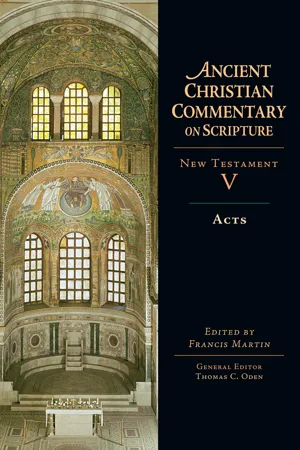
- English
- ePUB (mobile friendly)
- Available on iOS & Android
About this book
The Acts of the Apostles—or more in keeping with the author's intent, the Acts of the Ascended Lord—is part two of Luke's story of "all that Jesus began to do and teach." In it he recounts the expansion of the church as its witness spread from Jerusalem to all of Judea and Samaria and to the ends of the earth.While at least forty early church authors commented on Acts, the works of only three survive in their entirety—John Chrysostom's Homilies on the Acts of the Apostles, Bede the Venerable's Commentary on the Acts of the Apostles and a long Latin epic poem by Arator. In this Ancient Christian Commentary on Scripture volume, substantial selections from the first two of these appear with occasional excerpts from Arator alongside many excerpts from the fragments preserved in J. A. Cramer's Catena in Acta SS. Apostolorum. Among the latter we find selections from Basil the Great, Gregory of Nazianzus, Gregory of Nyssa, Ephrem the Syrian, Didymus the Blind, Athanasius, Jerome, John Cassian, Augustine, Ambrose, Justin Martyr, Irenaeus, Theodoret of Cyr, Origen, Cyril of Jerusalem, Cyril of Alexandria, Cassiodorus, and Hilary of Poitiers, some of which are here translated into English for the first time.As readers, we find these early authors transmit life to us because their faith brought them into living and experiential contact with the realities spoken of in the sacred text.
Tools to learn more effectively

Saving Books

Keyword Search

Annotating Text

Listen to it instead
Information
THE ACTS
OF THE APOSTLES
THE PROMISE OF THE HOLY SPIRIT
ACTS 1:1-5
1:1 All That Jesus Began to Do and Teach
1:2 The Day Christ Was Taken Up
Table of contents
- Cover
- Title Page
- Project Research Team
- Contents
- Publisher’s Note Regarding This Digital Edition
- General Introduction
- A Guide to Using This Commentary
- Abbreviations
- Introduction to the Acts of the Apostles
- The Acts of the Apostles
- Appendix: Early Christian Writers and the Documents Cited
- Biographical Sketches & Short Descriptions of Select Anonymous Works
- Timeline of Writers of the Patristic Period
- Bibliography of Works in Original Languages
- Bibliography of Works in English Translation
- Authors/Writings Index
- Subject Index
- Scripture Index
- Notes
- Praise for the Ancient Christian Commentary on Scripture
- About the Editor
- Ancient Christian Commentary on Scripture
- More Titles from InterVarsity Press
- Copyright Page
Frequently asked questions
- Essential is ideal for learners and professionals who enjoy exploring a wide range of subjects. Access the Essential Library with 800,000+ trusted titles and best-sellers across business, personal growth, and the humanities. Includes unlimited reading time and Standard Read Aloud voice.
- Complete: Perfect for advanced learners and researchers needing full, unrestricted access. Unlock 1.4M+ books across hundreds of subjects, including academic and specialized titles. The Complete Plan also includes advanced features like Premium Read Aloud and Research Assistant.
Please note we cannot support devices running on iOS 13 and Android 7 or earlier. Learn more about using the app